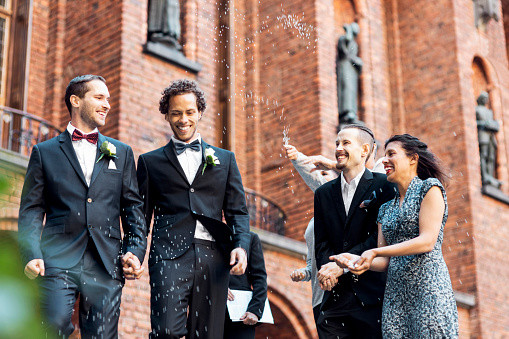
In a joyous event preceding the city's annual gay pride march, hundreds of same-sex couples and transgender individuals in Mexico City gathered on Friday to celebrate their weddings and the completion of administrative processes for gender identity changes.
Under the slogan "Hand in hand, we march with pride," around 120 couples fulfilled the necessary requirements to be legally married, as announced by the city government in a statement.
Marriage not only serves to formalize a couple's civil status but also grants them important legal rights and benefits.
"I didn't think it would happen like this. It's very exciting," Keila Espinoza, a 38-year-old who married her partner Vaneza Garcia, said it was very emotional to step into marriage after having lived together.
One groom, Edgar Mendoza, said he tied the knot after 10 years with his partner.
"This is a very important document, more than a piece of paper or a symbol of marriage. It is security that I can give to my family," he said.
In 2009, Mexico City made history by becoming the first jurisdiction in Latin America to legalize same-sex marriage.
However, it wasn't until last year that the rest of the country caught up, with Tamaulipas becoming the final state to legalize same-sex marriage in October.
This milestone marked the nationwide recognition of equal marriage rights for same-sex couples throughout Mexico.
According to the city government, an additional 131 people in the capital are soon expected to finalize their administrative gender-change processes.
This is a significant step for transgender individuals who often face numerous challenges when their legal documents, such as ID cards, do not align with their gender identity, Reuters reported.
Since a legal reform in 2014, adults in Mexico City have been able to change their gender on birth certificates and electoral cards if they identify with a gender different from their assigned one at birth. Notably, this process is free within the city.
On Saturday, supporters of LGBTQ+ rights will participate in a march down one of Mexico City's main avenues, leading to the central square.
The march aims to raise awareness of the violence and discrimination faced by the LGBTQ+ community and advocate for equality.
Last year's march, which marked the return after a two-year hiatus due to the COVID-19 pandemic, attracted hundreds of thousands of participants, as estimated by some sources.
© 2025 Latin Times. All rights reserved. Do not reproduce without permission.




